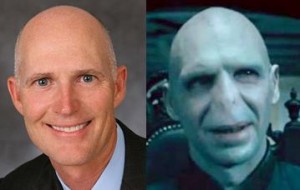Strikes in CA, Republicans in FL Admitting Loss of Quality: Fallout from Long-Term Underfunding of Higher Education

Since 1985, decreased funding of state universities has forced tuition to increase six-fold while consumer prices only doubled. (Bureau of Labor Statistics data via Economix blog.)
Back in early March, Catherine Rampell wrote in the New York Times about the ongoing trend since the mid 1980’s to cut state funding for higher education, noting that it has led to cutbacks in some of the very few areas of instruction where graduates actually face better employment prospects. She put up a companion piece at the Times’ Economix blog, where she was even more explicit about how it is the refusal by state legislatures to adequately fund higher education that is leading to the current problem of decreasing educational offerings despite skyrocketing tuition costs:
But at least at public colleges and universities — which enroll three out of every four American college students — the main cause of tuition growth has been huge state funding cuts.
There was quite a Twitter kerfluffle last week over the funding situation at the University of Florida, when it was claimed that Computer Science was being shut down while funds were being shifted to the athletic department. That was wrong on both counts, as the University is still struggling with how Computer Science will be organized, but it is not going away. Rather than taking money from academics, PolitiFact explains that the Athletic Association, which is a separate nonprofit, has given back over $60 million to the University since 1991 for academic use.
Unfortunately, that story obscured the real news on higher education in Florida, when Governor Rick Scott vetoed a bill that had passed the Florida legislature with a huge bipartisan majority, giving the University of Florida and Florida State University the ability to bypass the 15% per year limit on tuition increases in order to make up a larger portion of the huge cuts in state funding for higher education in this year’s budget:
The veto comes at a tense time, with universities bracing for a painful state budget cut for the fifth year in a row. This year, the total cut to the system is $300 million. Read more →

